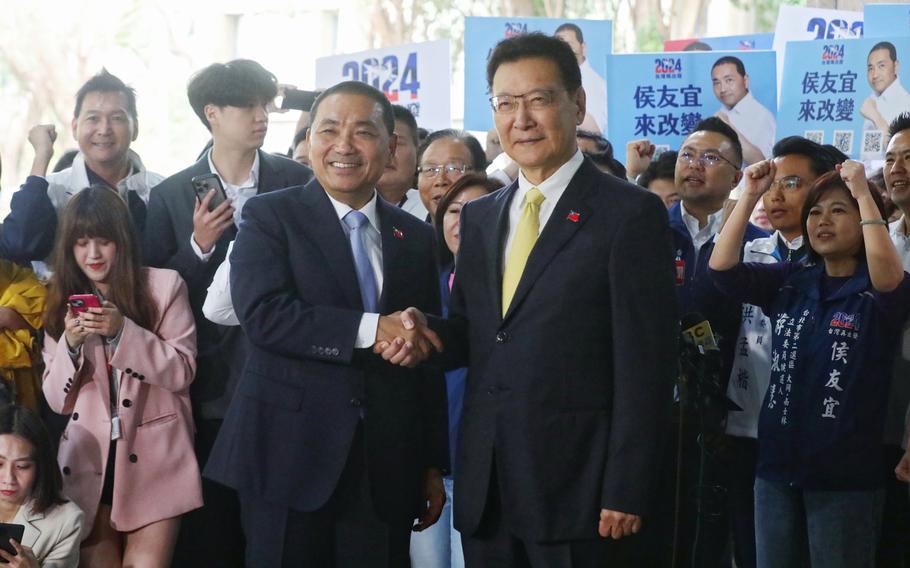
Kuomintang presidential candidate Hou Yu-ih, left, and his running mate Jaw Shaw-kong. (I-Hwa Cheng/Bloomberg)
Taiwan’s voters in January will have the chance to reset the island’s fraught relationship with China, and cool down one of the world’s key geopolitical flashpoints.
With less than seven weeks to go until polling day, that prospect now hangs in the balance after opposition parties that seek better relations with Beijing failed to unite behind a single candidate, despite weeks of chaotic and often acrimonious negotiations that played out in public.
The collapse of the opposition alliance makes Chinese President Xi Jinping’s stated goal of voluntary unification with Taiwan more remote, with pro-Beijing votes scattered among the challengers to the incumbent Democratic Progressive Party. That would benefit the ruling party’s candidate, Vice President Lai Ching-te, who wants to further strengthen Taiwan’s ties with Washington.
Standing in Lai’s way are the Kuomintang’s Hou Yu-ih and the Taiwan People’s Party’s Ko Wen-je, both of whom have said they plan to restart direct talks with Beijing. Foxconn Technology Group founder Terry Gou withdrew from the presidential race just hours before Friday’s registration deadline, saying he did so for the “greater good” to give the two remaining opposition candidates a better chance of unseating the DPP.
Despite the fractured opposition, an unprecedented third straight term in power for the DPP is by no means a foregone conclusion. After almost eight years in power, there’s growing unhappiness with the party, especially among younger voters. Support for Lai dipped to 31.9%, leaving him just a fraction ahead of the KMT’s Hou on 30%, according to a survey by the Taiwan Public Opinion Foundation released Sunday. Ko trails in third place on 26%.
“There are a substantial amount of voters who want a change,” said Wei-Ting Yen, assistant professor at Franklin & Marshall College in Pennsylvania. “So there is a higher chance for the DPP to lose the majority in the legislature.”
Geopolitical tensions with China are also giving opposition candidates something to seize on.
“Current trends look dangerous to many Taiwanese voters,” said Kharis Templeman, a research fellow at the Hoover Institution at Stanford University who cited concerns about “sudden economic embargoes, more diplomatic isolation and more threats of war.”
The KMT’s Hou can “credibly claim” his administration would be able to work with Beijing, Templeman said, adding that his election “could also buy time for Taiwan to implement more extensive defense reforms.”
Friday’s registration deadline for the election confirmed the final roster of candidates contesting the Jan. 13 vote. Their choices of vice presidential running mates also provided strong indications of where their priorities lie.
Lai’s vice presidential pick, Hsiao Bi-khim — Taiwan’s former de facto ambassador to the U.S. — points to his party’s efforts to build upon its success in strengthening unofficial ties overseas, especially with Washington.
“We’ve been put in a situation where geostrategic challenges are formidable and the rock-solid partnership with the U.S. is critically important,” Hsiao said at a press conference Thursday.
While the U.S. doesn’t formally recognize Taiwan as a nation, it has vowed to help the island defend itself against what American officials say is an increasingly aggressive China. Beijing views Taiwan as a part of Chinese territory.
Both Lai and Hsiao assert Taiwan is already a de facto sovereign country in need of greater international recognition. China has labeled Lai a “troublemaker,” and has put Hsiao on its sanctions list of “die-hard” Taiwan independence supporters.
Their potential to win January’s vote raises the stakes for Beijing. Responding to the breakdown in opposition talks, China’s Taiwan affairs office issued a statement saying it hopes Taiwanese voters “oppose independence” and make the right choice when facing peace or war, prosperity or recession, according to a China Central Television report.
Hou selected television presenter and media owner Jaw Shaw-kong as his running mate. A former KMT legislator in the 1980s, Jaw split from the party in the early 1990s to co-found a hardline unification political party, only to rejoin the KMT in 2021.
Hou’s choice of a China-leading vice president “sends a clear signal that they aim to consolidate the blue voters,” Franklin & Marshall College’s Yen said, referring to that part of the electorate that favors Taiwan’s eventual unification with China. “If the KMT is successful in the strategic voting campaign, we can expect the poll number to go up for the KMT candidate, and it will be a much closer race,” she said.
With assistance from Jill Disis.